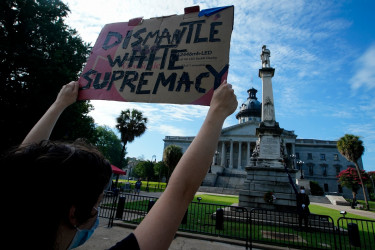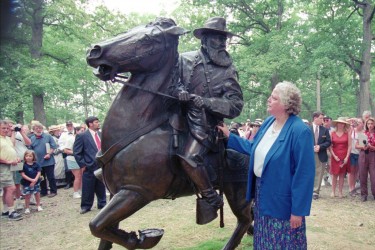In an interview Monday, White House Chief of Staff John F. Kelly remarked that “the lack of an ability to compromise led to the Civil War.” Kelly was responding to a question about the decision of an Episcopal Church in Alexandria, Va., to remove a plaque honoring Confederate General Robert E. Lee, whom he called an “honorable man” driven by his conscience to secede from the Union.
By blaming a failure of compromise for the Civil War, Kelly repeated a well-worn tenet of the Lost Cause narrative that valorizes the Confederacy and its leaders like Lee. In this narrative, the failure to compromise is laid at the feet of radical abolitionists and Northern politicians, including the newly elected president, Abraham Lincoln, who gave Southerners no choice but to secede.
But it was slavery, and the refusal of Southern slaveholders to compromise on slavery, that launched the Civil War. In fact, the secession crisis of 1860-61 was the culmination of a decade-long movement led by ultra-radical pro-slavery “Fire-Eaters.” After decades of compromise between the North and South, the election of Lincoln spurred an almost paranoid anxiety about slavery’s future that made compromise untenable and war virtually unavoidable.
That technically makes Kelly correct. There was a failure of compromise. But lamenting it without addressing the role of slavery at its root reflects the flawed, Southern version of Civil War history that has nourished the white nationalism currently poisoning American politics.
Beginning in the early 1850s, Fire-Eaters had urged secession as the only way to guarantee the continued protection of slavery in the face of what they saw as an undeniable conspiracy of abolitionism. The growing cotton economy also contributed to their desire to protect the “peculiar institution.” No longer a regrettable system thrust upon them by history, slavery had become, in the words of South Carolina Sen. John C. Calhoun, “a positive good.”
Anyone who refused to accept this new dictum was slavery’s enemy. In spite of Fire-Eaters’ suspicions and agitation, Northerners were actually more than willing to compromise with them and meet many of their demands. The Compromise of 1850 even included a revamped Fugitive Slave Law that required all Northerners to assist in returning suspected runaways and denied those apprehended the right to trial — drawing howls of protests from abolitionists.
This agreement reflected most, if not all, of the Fire-Eaters’ demands. It reinforced slavery’s constitutional protections and loosened its territorial limitations. Lands acquired from Mexico, except for the new state of California, would be open to slavery via popular vote.
These compromises, however, failed to satisfy Fire-Eaters and their insatiable desire to dictate American domestic and foreign policy. They wanted unambiguous and eternal protections allowing for the expansion of slavery into the western territories and beyond.
The ensuing decade featured guerrilla warfare in Kansas, attempts to gain a foothold for slavery abroad, and increasingly volatile rhetoric both in and out of Congress. This rhetoric reflected that these “ultras” had rejected compromise — even if they hadn’t persuaded their fellow Southerners to join them yet.
Emboldened by the inaction of weak and complicit presidents like Millard Fillmore and James Buchanan, along with a dramatic break with the Democratic Party at the convention in April 1860, Fire-Eaters prepared for their ultimate show of strength.
Their moment came with the election of Lincoln. Hardly an abolitionist, Lincoln nonetheless embodied all that Southern slaveholders feared. In their ordinance of secession, issued only six weeks after the election, South Carolina delegates refused to mention the new president by name but quoted from his 1858 “House Divided” speech, in which he declared that “government cannot endure permanently half slave, and half free.” To white South Carolinians, this was proof that slavery was destined for “ultimate extinction.” On Dec. 24, the secession convention adopted the resolution declaring the Union dissolved.
While South Carolinians debated disunion, Kentucky senator and former vice president John J. Crittenden introduced a proposal to head off the secession crisis: a final compromise to save the Union. Known as the Crittenden Compromise, this series of proposed constitutional amendments would have guaranteed slavery’s existence in perpetuity. It reaffirmed previous compromises, like the opening of slavery in all territories south of the 36/30 line (as designed by the Missouri Compromise in 1820), a ban on congressional interference with the interstate slave trade and federal compensation for owners of fugitive slaves.
Most importantly, no future amendments could alter these or in any way interfere with slavery, providing an ironclad guarantee for the Fire-Eaters.
For congressional Republicans, this compromise, which would have allowed for slavery’s expansion, was a nonstarter. In his inaugural address, Lincoln gestured toward a possible constitutional amendment protecting slavery where it existed, but on the question of its expansion he too was adamant: He would not support it. Allowing slavery to expand wasn’t a negotiation — it was capitulation.
Yet Southerners were also hostile to the deal, despite its profuse concessions. For them, compromise of any sort was no longer an option.
As early as Dec. 2, Mississippi senator and soon-to-be Confederate president Jefferson Davis dismissed the very idea of negotiation, saying, “no human power can save the Union.” On Dec. 13, still two weeks before South Carolina’s secession, 30 representatives from the lower South, the seat of Fire-Eater insurgency, proclaimed, “The argument is exhausted. All hope of relief in the Union, through the agency of committees, congressional legislation, or constitutional amendments, is extinguished, and we trust the South will not be deceived by appearances of the pretense of new guarantees.”
An independent nation, founded upon the “cornerstone” of slavery, was the best and only way forward to protect the South’s way of life, according to Confederate Vice President Alexander Stephens.
Others had tired of compromise as well. The small yet vocal contingent of radical abolitionists who had long called for an immediate end to slavery added much kindling to the Fire-Eater’s conflagration. Their constant agitation on the issue turned the slavery question into a moral crusade. In such a worldview, compromise on slavery was not only unlawful but also sinful.
Enslaved people, too, had had enough. On May 23, 1861, before the war even began in earnest, three enslaved men — Frank Baker, Sheppard Mallory and James Townsend — rowed a boat to Fortress Monroe in Virginia and presented themselves to the commander, Gen. Benjamin F. Butler. For these men, the war offered the opportunity for freedom and they were determined to take it. Within a week, they were joined by 47 other “contrabands of war.”
Soon the trickle would become a flood. By war’s end, tens of thousands of enslaved people had joined what W.E.B. Du Bois called the “general strike” to demand their freedom.
From the founding of the Republic through 1860, Northerners and Southerners went to great lengths to find a way to make slavery work. But in the end, it was the South’s unwillingness to compromise that ultimately launched a war that led to slavery’s demise.
Without a full accounting of Southerners’ role in this history, we risk reiterating the old, Southern apologies for slavery and the Civil War in which figures like Lee are seen as victims of failed negotiations with the North rather than defenders of an inhumane and immoral institution. But it also raises the question: Why do we continue to champion compromise when it was so long used to further the cause of human injustice? Perhaps, in this case, the failure to compromise should be celebrated rather than lamented.











